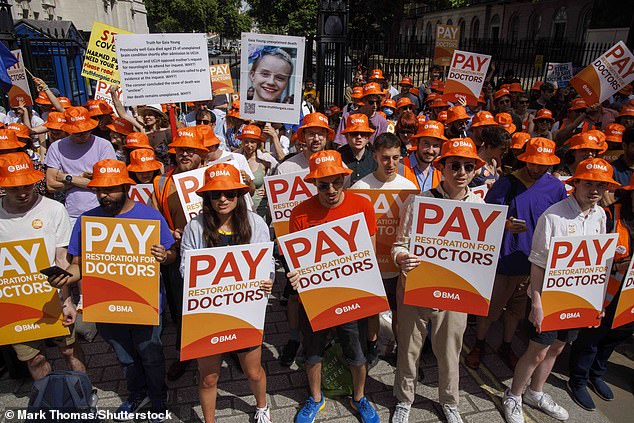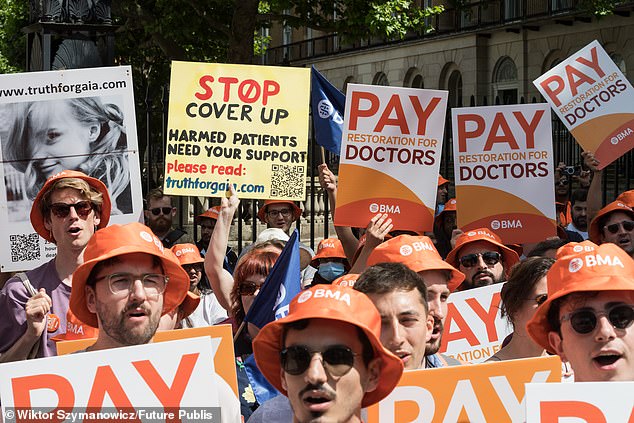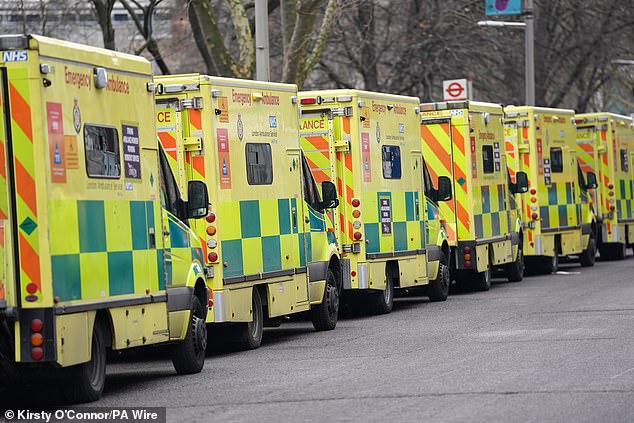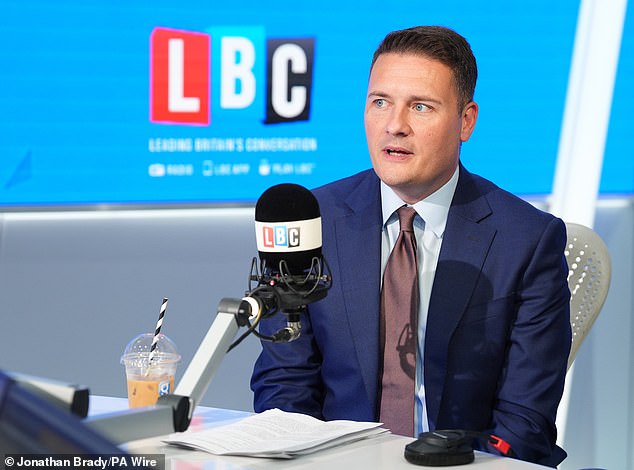Junior doctor strikes have resulted in the deaths of five patients as NHS leaders warn even ‘more lives could be put at risk’ during next week’s five-day full walkout.
An audit shows strikes by the BMA in 2023 and 2024 were raised in five Prevention of Future Death Reports issued by coroners.
Among these was the case of Daphne Austin, 71, whose passing from sepsis was found to be the result of neglect and ‘more likely than not because of industrial action by junior doctors’.
As reported by The Times, Ms Austin was one of 25 patients under the care of a single consultant at Cumberland Infirmary on the day of the strike in June 2023 – which meant she received ‘no medical input’ or vital blood testing, an inquest heard.
Another reported death was that of John Doyle, 60, who passed away of multi-organ failure in Warwickshire during the junior doctors’ strike in December 2023.
NHS England was warned by the coroner senior doctors were ‘unable to maintain a consistent overview of patients’ due to additional workload during strikes.
William Hare, 71, died in Essex in January 2024 amid disruption to ‘normal service’ during strikes which led to delays in care and neglect.
A number of other patients are likely to have died or come to harm as a result of delays caused by 44 previous days of strikes by BMA junior doctors, health leaders warned.

Strikes by the BMA in 2023 and 2024 were raised in five Prevention of Future Death Reports. Pictured: Junior doctors demonstrate opposite Downing Street on June 27 2024

NHS England was warned by the coroner senior doctors were ‘unable to maintain a consistent overview of patients’ due to additional workload during strikes

A number of other patients are likely to have died or come to harm as a result of delays caused by 44 previous days of strikes by BMA junior doctors, health leaders warned (file image)
Strikes from March 2023 to July 2024 led to the cancellation of 1.5million appointments and operations, including more than 6,500 cancer surgeries.
Health secretary Wes Streeting will be meeting BMA leaders in Whitehall on Thursday afternoon in a last ditch attempt to get them to call off next week’s strikes.
Mr Streeting has insisted he has no plans of offering more money but is willing to reform working conditions and training.
According to a Whitehall source, strikes in the health service ‘have the most serious consequences’.
The source added: ‘The fact that the BMA rushed into strike action, even after a 28.9 per cent pay rise, and that they are telling striking resident doctors not to inform their employers to allow hospitals to plan, shows a unfathomable disregard for the wellbeing of patients.’
Up to 50,000 junior doctors – who now go by the name resident doctors – will strike for five days from 7am on Julye 2 in pursuit of a 29 per cent pay rise.
Hospitals may rack up a bill of £4,000 for extra shifts that cover striking junior colleagues in urgent care.
But the BMA said: ‘Strikes need not happen next week if the government comes forward with a plan to restore doctors’ pay and rebuild the value of our workforce.’

Wes Streeting (pictured) has insisted he has no plans of offering more money but is willing to reform working conditions and training

Daniel Elkeles, the chief executive of NHS Providers said: ‘It’s no surprise that some coroners found that delays led to some deaths that would have been prevented’ (file image)
‘Planning by NHS England and hospitals is essential to keep urgent and emergency care safe during strike action and this requires NHS England to work differently; for example, we expect they are now working quickly with hospitals to plan changes to non-urgent care so urgent and emergency services can be maintained on strike days. There should be no excuse for failing to plan for such events.
‘Successive rounds of action have shown that most hospital trusts run safe services, with senior doctors covering striking doctors, and several studies and analyses of hospital data that suggest mortality rates for patients admitted to hospital are not significantly different on strike days.’
Daniel Elkeles, the chief executive of NHS Providers said: ‘It’s no surprise that some coroners found that delays led to some deaths that would have been prevented had treatment gone ahead as planned.
‘That’s why we say firmly that these strikes are damaging, disruptive, costly and unfair to patients whose care has to be postponed at short notice, which can have harmful effects on their health and conditions, both physical and mental. That’s why we hope very much that negotiations will lead to this strike being called off.’





![Paul O'Grady 's widower Andre Portasio [pictured right, with Paul in 2018] has slashed the price of the star's £3.5 million Edwardian mansion by 30%, it's been reported](https://www.americanpolibeat.com/wp-content/uploads/2025/07/Paul-OGradys-widower-slashes-price-of-stars-35M-Edwardian-mansion-350x250.jpg)






